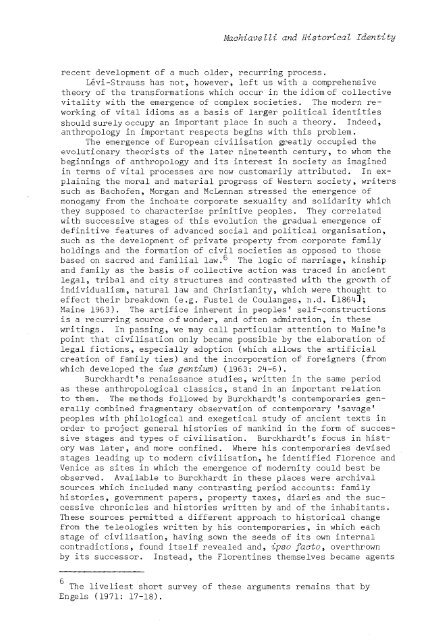CONTENTS NO.I - Institute of Social and Cultural Anthropology ...
CONTENTS NO.I - Institute of Social and Cultural Anthropology ...
CONTENTS NO.I - Institute of Social and Cultural Anthropology ...
You also want an ePaper? Increase the reach of your titles
YUMPU automatically turns print PDFs into web optimized ePapers that Google loves.
Machiavelli <strong>and</strong> Historical Identity<br />
recent development <strong>of</strong> a much older, recurring process.<br />
Levi-Strauss has not, however, left us with a comprehensive<br />
theory <strong>of</strong> the transformations which occur in the idiom <strong>of</strong> collective<br />
vitality with the emergence <strong>of</strong> complex societies. The modern reworking<br />
<strong>of</strong> vital idioms as a basis <strong>of</strong> larger political identities<br />
should surely occupy an important place in such a theory. Indeed,<br />
anthropology in important respects begins with this problem.<br />
The emergence <strong>of</strong> European civilisation greatly occupied the<br />
evolutionary theorists <strong>of</strong> the later nineteenth century, to whom the<br />
beginnings <strong>of</strong> anthropology <strong>and</strong> its interest in society as imagined<br />
in terms <strong>of</strong> vital processes are now customarily attributed. In explaining<br />
the moral <strong>and</strong> material progress <strong>of</strong> Western society, writers<br />
such as Bach<strong>of</strong>en, Morgan <strong>and</strong> McLennan stressed the emergence <strong>of</strong><br />
monogamy from the inchoate corporate sexuality <strong>and</strong> solidarity which<br />
they supposed to characterise primitive peoples. They correlated<br />
with successive stages <strong>of</strong> this evolution the gradual emergence <strong>of</strong><br />
definitive features <strong>of</strong> advanced social <strong>and</strong> political organisation,<br />
such as the development <strong>of</strong> private property from corporate family<br />
holdings <strong>and</strong> the formation <strong>of</strong> civil societies as opposed to those<br />
based on sacred <strong>and</strong> familial law. 6 The logic <strong>of</strong> marriage, kinship<br />
<strong>and</strong> family as the basis <strong>of</strong> collective action was traced in ancient<br />
legal, tribal <strong>and</strong> city structures <strong>and</strong> contrasted with the growth <strong>of</strong><br />
individualism, natural law <strong>and</strong> Christianity, which were thought to<br />
effect their breakdown (e.g. Fustel de Coulanges, n.d. [1864];<br />
t1aine 1963). The artifice inherent in peoples' self-constructions<br />
is a recurring source <strong>of</strong> wonder, <strong>and</strong> <strong>of</strong>ten admiration, in these<br />
writings. In passing, we may call particular attention to Maine's<br />
point that civilisation only became possible by the elaboration <strong>of</strong><br />
legal fictions, especially adoption (which allows the artificial<br />
creation <strong>of</strong> family ties) <strong>and</strong> the incorporation <strong>of</strong> foreigners (from<br />
which developed the ius gentium) (1963: 24-6).<br />
Burckhardt's renaissance studies, written in the same period<br />
as these anthropological classics, st<strong>and</strong> in an important relation<br />
to them. The methods followed by Burckhardt's contemporaries generally<br />
combined fragmentary observation <strong>of</strong> contemporary 'savage'<br />
peoples with philological <strong>and</strong> exegetical study <strong>of</strong> ancient texts in<br />
order to project general histories <strong>of</strong> mankind in the form <strong>of</strong> successive<br />
stages <strong>and</strong> types <strong>of</strong> civilisation. Burckhardt's focus in history<br />
was later, <strong>and</strong> more confined. Where his contemporaries devised<br />
stages leading up to modern civilisation, he identified Florence <strong>and</strong><br />
Venice as sites in which the emergence <strong>of</strong> modernity could best be<br />
observed. Available to Burckhardt in these places were archival<br />
sources which included many contrasting period accounts: family<br />
histories, government papers, property taxes, diaries <strong>and</strong> the successive<br />
chronicles <strong>and</strong> histories written by <strong>and</strong> <strong>of</strong> the inhabitants.<br />
These sources permitted a different approach to historical change<br />
from the teleologies written by his contemporaries, in which each<br />
stage <strong>of</strong> civilisation, having sown the seeds <strong>of</strong> its own internal<br />
contradictions, found itself revealed <strong>and</strong>, ipso facto, overthrown<br />
by its successor. Instead, the Florentines themselves became agents<br />
6 Th . . .<br />
e llvellest short survey <strong>of</strong> these arguments remalns that by<br />
Engels (1971: 17-18).

















